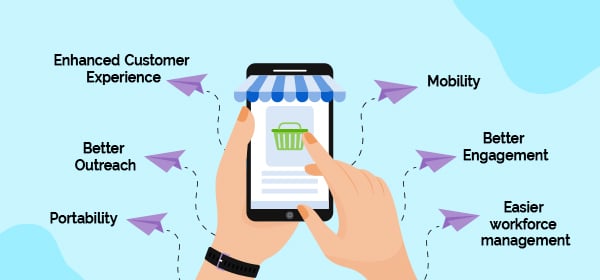In today’s rapidly changing digital environment, the significance of mobile apps in driving digital transformation is profound and multifaceted. As businesses seek to remain competitive and relevant, they are increasingly turning towards a comprehensive mobile app growth strategy, which serves as a foundational element in their broader digital transformation roadmap. This strategy is not just about the development and deployment of mobile applications; it’s about creating a holistic approach that encompasses user engagement, experience, and the seamless integration of technology into everyday business processes.
The development of a mobile app growth strategy is more than just an operational task; it’s a strategic initiative that aligns with a company’s overall goals. It involves identifying target audiences, understanding their needs, and crafting experiences that not only meet but exceed their expectations. This strategy is about nurturing a relationship with users, from the moment they download the app to every interaction that follows. It’s about continuous improvement and adaptation, ensuring that the app remains relevant and engaging in a rapidly changing market.
The role of mobile apps in fostering sustained growth for businesses is undeniable. By opening up new channels for customer engagement and revenue generation, these apps provide businesses with opportunities to expand their reach and solidify their market position. A well-executed mobile app growth strategy enhances brand loyalty and customer satisfaction, which are crucial for long-term success. As businesses continue to navigate the digital landscape, the strategic use of mobile apps becomes a key determinant of their ability to not only survive but thrive in an increasingly digital world.

Understanding the Mobile App Growth Strategy
The Emergence of Mobile Apps in Digital Transformation
Rise in Mobile App Usage: The digital age has seen a significant increase in mobile app usage. This trend is a critical component of digital transformation strategies for businesses.
Consumer Reliance on Smartphones: As consumers increasingly use smartphones for daily activities, businesses are motivated to develop mobile apps to cater to this trend.
Focus on Convenience and Personalization: Mobile apps offer convenience, speed, and personalized experiences, aligning with changing consumer behaviors and market demands.
Mobile-Centric Strategies: Businesses are shifting towards mobile-centric strategies, recognizing the role of mobile apps in engaging modern consumers.
Integrating Mobile Apps into Digital Transformation Roadmaps
Beyond App Development: Integration is more than just creating an app; it involves aligning the app with the broader business objectives and customer needs.
Strategy for Growth: A successful mobile app strategy focuses on seamless user experiences, customer engagement, and offering unique services that set a brand apart.
Bridging the Gap with User-Centric Mobile Apps
User-Centric Approach: Developing apps with a focus on the target audience’s specific needs and preferences enhances user engagement and fosters brand loyalty.
Brand Loyalty and Advocacy: This strategy is effective in increasing user engagement and encouraging brand loyalty and advocacy.
Overcoming Digital Transformation Challenges through Mobile Solutions
Addressing Transformation Challenges: Businesses face challenges like adapting to evolving technology, meeting customer expectations, and integrating mobile solutions with existing systems.
Role of Effective Mobile Apps: Well-designed mobile apps offer scalable, flexible, and customer-focused solutions to navigate these challenges.
Enhancing Customer Experience with Mobile Technology
Improving Customer Experience: Mobile apps are crucial in enhancing customer experience by providing direct interaction channels, personalized services, and feedback mechanisms.
Streamlining Operations and Data Accessibility
Operational Efficiency and Insights: Mobile apps streamline operations and improve data accessibility, leading to increased efficiency and valuable insights into customer behavior for better decision-making and strategy development.

The Impact of Mobile Apps on Business Growth
Driving Business Growth with a Mobile App Growth Strategy
Expansion of Reach: Mobile apps enable businesses to reach a broader audience, breaking geographical barriers.
Enhanced Customer Engagement: Apps provide an interactive platform for customers, improving engagement through direct communication and personalized experiences.
Increased Revenue: By facilitating marketing, sales, and customer service, mobile apps can significantly contribute to revenue growth.
Competitive Advantage: In the digital marketplace, having a robust mobile app can provide businesses with a distinct competitive edge.
Mobile Apps as Tools for Customer Engagement and Retention
Personalized Customer Experiences: Mobile apps allow for personalized interactions, tailored to individual customer preferences and behaviors.
Customer Loyalty and Repeat Business: By engaging customers effectively, businesses can foster loyalty and encourage repeat transactions.
Leveraging Mobile Analytics for Strategic Insights
Understanding User Behavior: Mobile analytics offer deep insights into how users interact with the app, what they prefer, and what they avoid.
Informing Strategy: These insights are invaluable for refining and aligning the mobile app growth strategy with both business goals and customer needs.
The Role of Mobile Apps in Expanding Market Reach
Global Accessibility: Mobile apps make it possible for businesses to reach a global audience, thus opening up new markets and customer bases.
Scaling Opportunities: This expanded reach is particularly crucial for businesses looking to scale and grow beyond their local or national markets.
Innovating with Mobile Technologies
Embracing Cutting-Edge Tech: Incorporating advanced technologies like AI, AR, and VR can transform the user experience, making it more immersive and interactive.
Differentiation in the Market: Businesses that innovate with these technologies can distinguish themselves in an increasingly crowded digital space.
Conclusion: The Future of Mobile Apps in Digital Transformation
The integration of mobile apps into digital transformation strategies marks a critical shift in the business landscape. Far from being a mere trend, it represents a fundamental change in how companies engage with their customers and navigate the digital environment. Mobile apps serve as key interfaces for customer interaction, offering personalized experiences and streamlined services. They are essential tools for businesses to maintain relevance and competitive edge in a rapidly evolving digital marketplace. As technology advances, mobile apps are becoming increasingly sophisticated, enabling businesses to leverage them for innovative marketing, enhanced customer service, and efficient operation management.
Looking towards the future, the trajectory of digital transformation is unmistakably intertwined with mobile technology. The continuous evolution of mobile apps opens up novel opportunities for businesses to innovate and expand. Companies that understand and adeptly incorporate mobile apps into their growth strategies are likely to excel in the digital age. These businesses will not only meet the growing demands and expectations of tech-savvy consumers but will also harness the full potential of digital transformation to drive growth, customer engagement, and operational efficiency. Embracing mobile apps is no longer optional but a critical necessity for success in the ever-changing digital landscape.
What is a mobile app growth strategy?
A mobile app growth strategy is a plan businesses implement to increase user acquisition, engagement, and retention through their mobile app. It aligns with the company’s overall digital transformation roadmap and addresses specific market and customer needs.
How do mobile apps overcome digital transformation challenges?
Mobile apps help overcome digital transformation challenges by providing flexible, scalable, and customer-focused solutions. They facilitate improved customer engagement, streamline operations, and integrate seamlessly with existing systems.
Why are mobile apps crucial in a digital transformation roadmap?
Mobile apps are crucial in a digital transformation roadmap because they cater to the growing demand for mobile-first experiences. They drive business growth by enhancing customer engagement, expanding market reach, and providing strategic insights through mobile analytics.


